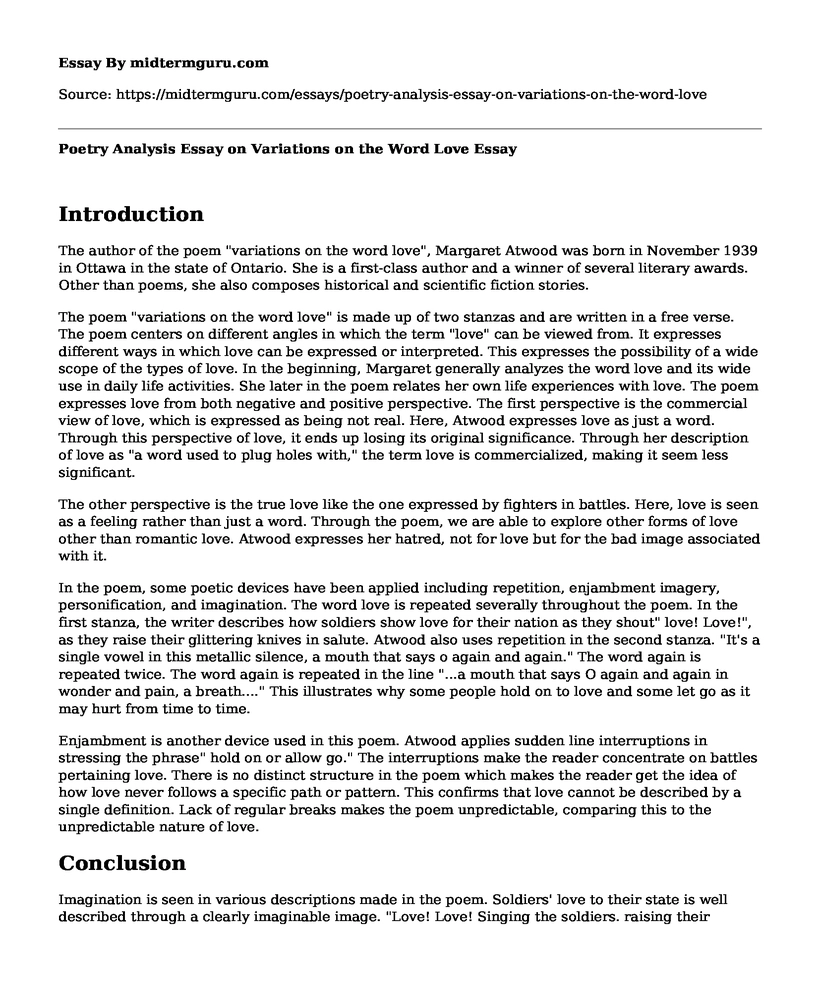Introduction
The author of the poem "variations on the word love", Margaret Atwood was born in November 1939 in Ottawa in the state of Ontario. She is a first-class author and a winner of several literary awards. Other than poems, she also composes historical and scientific fiction stories.
The poem "variations on the word love" is made up of two stanzas and are written in a free verse. The poem centers on different angles in which the term "love" can be viewed from. It expresses different ways in which love can be expressed or interpreted. This expresses the possibility of a wide scope of the types of love. In the beginning, Margaret generally analyzes the word love and its wide use in daily life activities. She later in the poem relates her own life experiences with love. The poem expresses love from both negative and positive perspective. The first perspective is the commercial view of love, which is expressed as being not real. Here, Atwood expresses love as just a word. Through this perspective of love, it ends up losing its original significance. Through her description of love as "a word used to plug holes with," the term love is commercialized, making it seem less significant.
The other perspective is the true love like the one expressed by fighters in battles. Here, love is seen as a feeling rather than just a word. Through the poem, we are able to explore other forms of love other than romantic love. Atwood expresses her hatred, not for love but for the bad image associated with it.
In the poem, some poetic devices have been applied including repetition, enjambment imagery, personification, and imagination. The word love is repeated severally throughout the poem. In the first stanza, the writer describes how soldiers show love for their nation as they shout" love! Love!", as they raise their glittering knives in salute. Atwood also uses repetition in the second stanza. "It's a single vowel in this metallic silence, a mouth that says o again and again." The word again is repeated twice. The word again is repeated in the line "...a mouth that says O again and again in wonder and pain, a breath...." This illustrates why some people hold on to love and some let go as it may hurt from time to time.
Enjambment is another device used in this poem. Atwood applies sudden line interruptions in stressing the phrase" hold on or allow go." The interruptions make the reader concentrate on battles pertaining love. There is no distinct structure in the poem which makes the reader get the idea of how love never follows a specific path or pattern. This confirms that love cannot be described by a single definition. Lack of regular breaks makes the poem unpredictable, comparing this to the unpredictable nature of love.
Conclusion
Imagination is seen in various descriptions made in the poem. Soldiers' love to their state is well described through a clearly imaginable image. "Love! Love! Singing the soldiers. raising their glittering knives in salutation. " one can clearly imagine how deep their love is for the nation they defend. Another incidence of imagination is when Atwood says "It's an individual vowel in this metallic silence. a oral cavity that says O once more and once more in admiration and hurting. a breath. a finger-grip on a Cliffside. " this expresses how confusing the feeling of love can be. After reading the line, the leader imagines the complexity of love.
Cite this page
Poetry Analysis Essay on Variations on the Word Love. (2022, Oct 05). Retrieved from https://midtermguru.com/essays/poetry-analysis-essay-on-variations-on-the-word-love
If you are the original author of this essay and no longer wish to have it published on the midtermguru.com website, please click below to request its removal:
- Essay on My Last Duchess by Robert Browning
- The Unbelievable Murders: We Have Always Lived in the Castle
- Book Analysis: Lunch Money by Andrew Clements - Paper Example
- Literary Analysis Essay on "The Storm" by Kate Chopin
- My research topic is: Maintaining Academic integrity among undergraduate students
- Literary Analysis of Kate Chopin's "The Story of An Hour"
- Essay Sample on Politeness in Evelina







